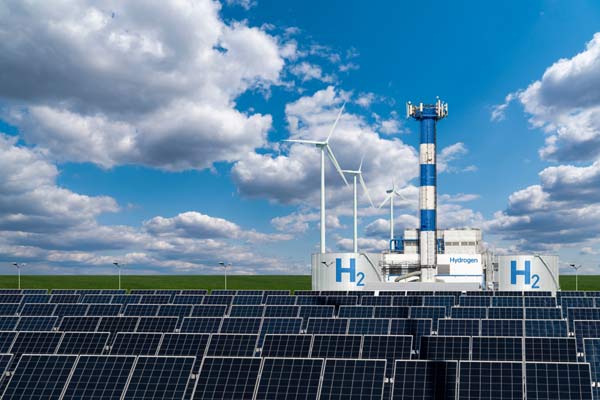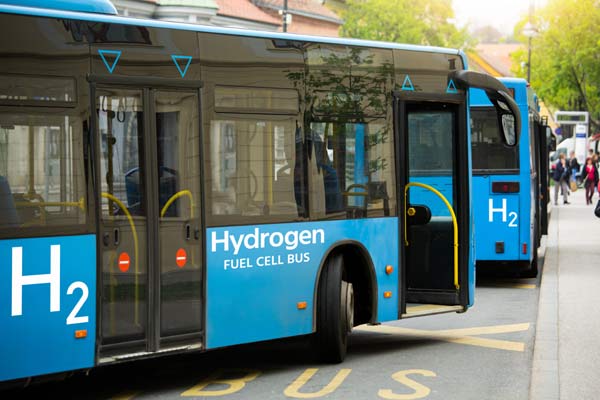Pros and Cons of Hydrogen Energy and Hydrogen Fuel
In recent years, hydrogen energy has emerged as a key player in the global quest for sustainable and clean energy solutions.
As the world grapples with the urgent need to reduce greenhouse gas emissions and transition away from fossil fuels, hydrogen presents itself as a potentially transformative element in the energy landscape.
Published: December 4, 2023.

Understanding Hydrogen Energy
What is Hydrogen Energy?
Hydrogen energy refers to the use of hydrogen, a light and highly reactive gas, as a source of energy. Hydrogen is the most abundant element in the universe, but it rarely exists in its pure form on Earth and must be extracted from compounds like water or fossil fuels.
The most appealing aspect of hydrogen as an energy carrier is that its combustion only produces water, making it a clean energy source, especially when its production is also environmentally friendly.
There are three primary types of hydrogen, classified by their production methods: green, blue, and grey.
Green hydrogen is produced via electrolysis of water using renewable energy sources like wind or solar, making it the cleanest form of hydrogen.
Blue hydrogen is derived from natural gas, with carbon capture and storage (CCS) technology mitigating the CO2 emissions.
Grey hydrogen, currently the most common form, is also produced from natural gas but without capturing the emitted carbon, making it less environmentally friendly.
There are other hydrogen color codes, but they are less frequently used: turquoise, brown, black, pink, purple, yellow, white, and even - gold hydrogen.
The Role of Hydrogen in the Energy Transition
Hydrogen energy is increasingly viewed as a pivotal component in the global energy transition. Its ability to provide clean energy and store excess electricity generated from renewable sources addresses two major challenges in the shift away from fossil fuels: reducing carbon emissions and managing the intermittency of renewable energy.
Hydrogen can be integrated into various sectors, including transportation, industry, and power generation, offering a versatile solution to decarbonize and improve energy efficiency.
Advantages of Hydrogen Energy
Environmental Benefits
The foremost advantage of hydrogen energy, particularly green hydrogen, is its environmental benefit.
When produced sustainably, hydrogen combustion releases no greenhouse gases or pollutants, only water vapor. This characteristic positions hydrogen as a key player in efforts to mitigate climate change and reduce air pollution.
Energy Efficiency and Storage
Hydrogen boasts a high energy density, meaning it contains more energy per unit of weight than most other fuels. This makes it particularly advantageous for applications where weight and space are critical factors, such as in transportation or space exploration.
Moreover, hydrogen can play a significant role in energy storage. It can be stored for long periods and transported over long distances, offering a solution to store surplus energy from intermittent renewable sources like solar and wind power.
Versatility and Sector Integration
One of the most compelling attributes of hydrogen is its versatility. It can be used across various sectors, making it a multifaceted tool in the energy transition.
In transportation, hydrogen fuel cells offer an alternative to conventional combustion engines and battery-electric vehicles. In industry, hydrogen can replace fossil fuels in high-temperature processes.
Additionally, in the power sector, hydrogen can be used to generate electricity and heat, offering a clean alternative to fossil fuels. This versatility not only aids in reducing emissions but also facilitates the integration of renewable energy into the existing energy infrastructure, enhancing overall system resilience and efficiency.

Disadvantages of Hydrogen Energy
While hydrogen energy offers numerous advantages, there are also significant challenges that need to be addressed to fully realize its potential.
Production Challenges
One of the primary disadvantages of hydrogen energy is the complexity and energy intensity of its production, especially for green hydrogen.
Electrolysis, the process of using electricity to split water into hydrogen and oxygen, is energy-intensive and currently expensive. The overall sustainability and carbon footprint of hydrogen depends heavily on the source of electricity used in this process.
For blue hydrogen, while carbon capture and storage (CCS) technology can mitigate CO2 emissions, it is not yet widely implemented and has its own environmental and economic challenges.
Grey hydrogen, though cheaper, relies on fossil fuels and contributes to greenhouse gas emissions, negating the environmental benefits of hydrogen as a clean energy carrier.
Storage and Transportation Issues
Hydrogen poses unique challenges in terms of storage and transportation. It has a low volumetric energy density, meaning it occupies a larger volume at standard pressure and temperature compared to other fuels.
This necessitates either high-pressure compression, liquefaction at cryogenic temperatures, or chemical storage in other compounds, all of which are energy-intensive and costly processes.
These factors complicate the logistics of hydrogen storage and transportation, impacting its overall efficiency and cost-effectiveness.
Economic Considerations
The economic viability of hydrogen energy is currently one of its biggest challenges. The infrastructure for large-scale production, storage, and distribution of hydrogen is still in its nascent stages and requires significant investment. The cost of renewable energy-powered electrolysis needs to decrease substantially for green hydrogen to become competitive with conventional fuels and even blue and grey hydrogen. Additionally, the market for hydrogen technology is still developing, and economies of scale have yet to be achieved.
Hydrogen Fuel in Transportation
Advantages in the Transportation Sector
Hydrogen fuel cells offer several advantages in the transportation sector, particularly for vehicles like buses, trucks, and even trains and planes, where battery weight and charging time are significant constraints.
- Zero-Emission Vehicles: Hydrogen fuel cell vehicles (FCEVs) only emit water vapor, making them an environmentally friendly alternative to internal combustion engine vehicles.
- Refueling Speed and Range: FCEVs can be refueled in a matter of minutes, similar to conventional gasoline or diesel vehicles. They also offer a longer range compared to many battery electric vehicles (BEVs), making them suitable for longer distances and heavy-duty applications.
Challenges in the Transportation Sector
Despite these advantages, hydrogen fuel faces several challenges in the transportation sector.
- Limited Refueling Infrastructure: One of the biggest hurdles for FCEVs is the lack of widespread hydrogen refueling stations. This infrastructure is costly to build and is not yet available on a scale comparable to gasoline stations or electric vehicle charging networks.
- Cost and Availability of FCEVs: Currently, FCEVs tend to be more expensive than traditional vehicles and BEVs, partly due to the high costs of fuel cell production and the nascent stage of the technology. Additionally, there are fewer models of FCEVs available on the market, limiting consumer choice.

The Future of Hydrogen Energy and Fuel
As we look towards the future, the trajectory of hydrogen energy and fuel is poised to be shaped significantly by advancements in technology and supportive policy and market frameworks.
Technological Advancements
The future of hydrogen energy is closely tied to technological innovations in several key areas:
- Improved Production Methods: Advances in electrolysis technology, including the use of novel catalysts and more efficient designs, could significantly reduce the cost and increase the efficiency of green hydrogen production. Similarly, improvements in carbon capture technologies could make blue hydrogen a more viable and environmentally friendly option.
- Storage and Transportation Solutions: Research into new materials and methods for hydrogen storage, such as solid-state hydrogen or advanced composite materials for tanks, could alleviate current challenges related to volume and safety. Similarly, innovations in transportation methods, including pipelines specifically designed for hydrogen or more efficient liquefaction processes, could reduce costs and logistical barriers.
- Fuel Cell Technology: Ongoing improvements in fuel cell efficiency, durability, and cost are crucial for the wider adoption of hydrogen in various sectors, especially transportation. Advances in this area could lead to more affordable and reliable hydrogen fuel cell vehicles and other applications.
Policy and Market Development
The role of government policies and international cooperation is paramount in promoting the development and adoption of hydrogen energy:
- Supportive Policies: Government incentives, subsidies, and funding for research and development can accelerate the advancement and commercialization of hydrogen technologies. Policies that encourage the use of clean hydrogen, especially in sectors that are hard to decarbonize, can create a significant market demand.
- International Collaboration: Global cooperation in terms of shared research, common standards, and trade agreements for hydrogen can facilitate a more rapid and cost-effective global transition to hydrogen energy.
- Market Growth and Investment: As the market for hydrogen technologies grows, increased investment from both the public and private sectors can drive down costs through economies of scale. A growing market can also stimulate further innovation and competition, leading to improved technologies and reduced prices.
Hydrogen energy, with its potential to provide clean, efficient, and versatile energy solutions, stands at the forefront of the global energy transition.
While there are significant challenges to overcome, particularly in terms of production efficiency, storage, transportation, and economic viability, the future is promising.
Technological advancements, coupled with supportive policies and market development, are key to unlocking the full potential of hydrogen as a cornerstone of a sustainable energy future.

